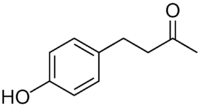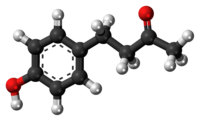Raspberry ketone facts for kids
Quick facts for kids Raspberry ketone |
|
|---|---|
 |
|
 |
|
|
Preferred IUPAC name
4-(4-Hydroxyphenyl)butan-2-one
|
|
| Other names | p-Hydroxybenzyl acetone; 4-(p-Hydroxyphenyl)-2-butanone; Frambinone; Oxyphenylon; Rheosmin; Rasketone |
| Identifiers | |
| Abbreviations | RK |
| CAS number | |
| PubChem | |
| EC number | 226-806-4 |
| ChEBI | CHEBI:68656 |
| SMILES | O=C(CCc1ccc(O)cc1)C |
|
InChI
InChI=1/C10H12O2/c1-8(11)2-3-9-4-6-10(12)7-5-9/h4-7,12H,2-3H2,1H3
|
|
| Properties | |
| Molecular formula | |
| Molar mass | 0 g mol-1 |
| Appearance | White needles |
| Melting point | |
| Boiling point | |
| Except where noted otherwise, data are given for materials in their standard state (at 25 °C, 100 kPa) | |
Raspberry ketone is a natural chemical found in plants. It is the main thing that gives red raspberries their special smell. This compound is a type of ketone, which is a group of chemicals.
Contents
Where Raspberry Ketone is Found
Raspberry ketone is naturally present in many fruits. You can find it in raspberries, cranberries, and blackberries. Plants make this chemical through a process called biosynthesis.
Getting raspberry ketone directly from fruit is hard. For example, one kilogram of raspberries has only about 1 to 4 milligrams of this compound. That's a very tiny amount!
How Raspberry Ketone is Made
Because it's so rare in nature, raspberry ketone is often made in factories. Scientists use different chemical methods to create it. One common way involves two main steps.
First, a chemical called acetone is mixed with another chemical, 4-hydroxybenzaldehyde. This creates a new compound. Then, this new compound is changed using a process called hydrogenation. This process adds hydrogen atoms to it. This two-step method can make raspberry ketone with a very high success rate.
What Raspberry Ketone is Used For
Raspberry ketone has several interesting uses. It is sometimes used in perfumes to give them a fruity scent. It's also found in some cosmetics.
In the food industry, it's added to foods to make them smell and taste fruity. Natural raspberry ketone is very expensive. It can cost as much as $20,000 for just one kilogram! Because of this high cost, the raspberry ketone used in most products is usually made in a factory. Factory-made raspberry ketone is much cheaper.
Marketing and Weight Loss
You might see products with raspberry ketone sold for weight loss. However, there is no scientific proof that these products help people lose weight. These products are sometimes called "ketones." This is because they contain a chemical group called a ketone, similar to ketone bodies that your body makes.
Safety Information
We don't know much about the long-term safety of taking raspberry ketone supplements. Not many studies have been done on humans. Raspberry ketone is similar to a stimulant called synephrine. Because of this, some people worry about its safety.
Some studies suggest it might affect the heart or how the body grows and develops. Also, many supplements that contain raspberry ketone have other ingredients. These can include things like caffeine, which might cause unsafe effects.
In 1965, the US Food and Drug Administration (FDA) said that raspberry ketone is "generally recognized as safe" (GRAS). This applies to the small amounts used to flavor foods, not large amounts in supplements.
Images for kids



